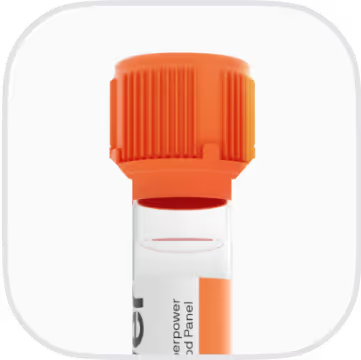What are Anorexia Nervosa biomarkers
Biomarkers for anorexia nervosa are not a single diagnostic test; they are a set of blood signals that reveal how the body is coping with prolonged energy shortage. They come from fat tissue, the gut, endocrine glands, organs, and bone, and together they show the state of nutrition, metabolism, and medical stability. Hormones that regulate appetite and energy use (leptin, ghrelin, insulin, thyroid hormones, cortisol) indicate how the brain and body have adjusted to scarcity. Sex hormones (estradiol, testosterone, LH/FSH) reflect reproductive shutdown and bone risk. Electrolytes and minerals (potassium, phosphate, magnesium, calcium) and organ enzymes (liver and kidney markers) flag heart, muscle, and organ strain and help anticipate refeeding complications. Blood counts (hemoglobin, white cells, platelets) show bone marrow stress. Bone turnover signals (osteocalcin, P1NP, CTX) and vitamin D tell us about bone building versus breakdown. Used together, these biomarkers translate a complex clinical picture into objective measures that guide safety, track recovery, and show when key systems are regaining normal function.
Why is blood testing for Anorexia Nervosa important?
- See how anorexia affects hydration, electrolytes, protein levels, and stress hormones.
- Spot dehydration or water-loading via sodium and albumin shifts that signal risk.
- Flag dangerous potassium or chloride losses from purging, which raise heart rhythm risks.
- Guide safer refeeding by tracking sodium and potassium shifts that precede complications.
- Clarify protein reserves with albumin, recognizing dehydration or inflammation can distort results.
- Track stress hormones with cortisol, which disrupts periods and accelerates bone loss.
- Protect fertility and pregnancy by normalizing electrolytes and cortisol before conception.
- Interpret results with symptoms, weight trends, ECG, magnesium, phosphate, and morning cortisol timing.
What insights will I get?
Blood testing in Anorexia Nervosa provides a window into how the body’s core systems are coping with prolonged undernutrition and stress. At Superpower, we focus on key biomarkers—Albumin, Sodium, Potassium, Chloride, and Cortisol—to assess the impact on energy balance, fluid and electrolyte stability, cardiovascular function, and the body’s stress response. These markers help reveal how the body is adapting, or struggling, to maintain essential physiological processes.
Albumin is a major blood protein produced by the liver, reflecting both nutritional status and the body’s ability to maintain fluid balance. Sodium, Potassium, and Chloride are electrolytes that regulate nerve signaling, muscle contraction, and hydration. Cortisol is a hormone released in response to stress, influencing metabolism, immune function, and the body’s adaptation to energy deficits. In Anorexia Nervosa, these markers often shift as the body prioritizes survival, sometimes at the expense of normal function.
Stable levels of Albumin suggest the body is still able to maintain protein stores and fluid distribution, but low levels may indicate severe malnutrition or other complications. Electrolyte imbalances—especially with Sodium, Potassium, and Chloride—can signal risk to heart rhythm, muscle function, and neurological stability. Elevated or suppressed Cortisol reflects the body’s stress load and adaptive capacity, with persistent changes potentially affecting mood, cognition, and immune resilience.
Interpretation of these biomarkers must consider factors like age, acute illness, medications (such as diuretics or steroids), and laboratory methods, all of which can influence results and their significance in the context of Anorexia Nervosa.







.avif)



.svg)





.svg)


.svg)


.svg)

.avif)
.svg)










.avif)
.avif)
.avif)


.avif)
.avif)




.svg)




.avif)


